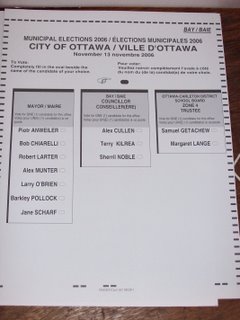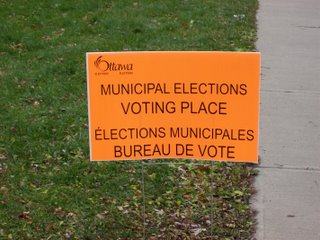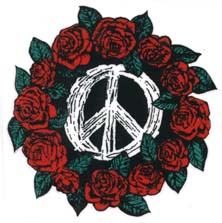Whatever happened to the concept of young people, in this case someone who was barely a teenager, from listening to the advice of their elders?
First of all, let's get one thing straight, now that I am 38 I have come to the sober realization that the youth of today see me as being old, and I see some of them as being quite annoying (not unlike the way I viewed my elders in my youth, without the lack of respect part though).
This morning, while taking the bus downtown, I was confronted with the latest situation in a long line of examples that could be tabled as "exhibits for the prosecution". While sitting, reading my book ("Synchronicity" by C.G. Jung), a rather slightly built youth took his place in front of me and began his ride holding onto the strap which was right in front of me instead of taking hold of the pole which was directly in front of where he was standing.
As soon as the bus turned around its first corner the expected happened: the boy bumped into my book (no acknowledgment or apology, of course), and he nearly fell over, bumping into the passenger behind him. Observing this I offered him some advice.
"Why don't you hold onto the pole instead of the strap, the pole doesn't move while the strap does." Having said this he gave me a bemused look, then proceeded to expound upon the merits of the strap, until I interrupted him. "Yes, but you have already hit my book once, as well as other passengers."
"Have I?"
As he launched into another dissertation on strap-pole qualities (while losing his balance) I returned to my reading, saying, "this isn't a conversation, I was offering an observation and an opinion."
As expected, when he and his friend exited the bus I could hear the derisive laughter of the boys, though I couldn't make out anything past "who does he ..."
Well, that is a question that can be answered, even without having heard it in its entirety. I was merely another passenger on the bus, trying to get to my destination without being accosted by another rider. As soon as this boy got on the bus he was a menace. His over-stuffed bag hit several people, including the driver (I was sitting at the very front and saw him get on), and he dropped it on my knee while putting it down, again without even acknowledging that he may have done something wrong. I'm not writing this because of my knee, however, but rather because of his absolute refusal to accept any offer of an individual's opinion from someone who may just have had a bit more experience than he does.
This is the thing that amazes me the most about these kids: they talk and act as if they know absolutely everything about everything, while, in point of fact, they often end up having "book jacket knowledge". That is the type of knowledge that you can glean from a book by reading the inside and outside covers, without having to waste your time by actually reading the work itself.
During the summer I encountered a perfectly precious example of this while in one of my favourite places to write, the coffee shop near my chiropractor's office (I'm not going to plug the store as the new owner is turning the place into a rather unpleasant place to sit in and spend some time, which is the exact opposite of the previous manager’s philosophy, so I feel no loyalty towards it anymore ... but that's another story for another time). While I was there writing there was a clutch of young people deeply involved in a rather heady discussion regarding various religions and other belief systems. They were also having a discussion, after a time, about the theological differences between the monotheistic faiths, discussing the natures of Islam, Judaism and Christianity, with some forays into some other religions as well.
I wasn't trying to overhear their conversation, but they were sitting right next to me, so it was quite difficult to ignore them, which was why I couldn't help but overhear the errors that they were espousing with such confidence as being factual. For some reason, perhaps because of my upbringing, I seem to be overly sensitive to the presence of misinformation and feel the need to correct the matter if I am able. In the case of the discussion regarding Christianity and Judaism, it seemed that I was able to contribute far more than any of the youths were, and my rudimentary knowledge of Islam (the result of one course in during my undergraduate degree) also dwarfed the self-confessed "expert" of the group who knew nothing of the historical background of the religion.
This group, unlike the boy on the bus this morning, was more than welcoming of my opinions when I made a small comment and ended up joining their conversation. We ended up talking for well over an hour, and in the end I was the one who had to leave due to another engagement. Where one group of teenagers does not feel threatened by listening to the opinions of someone older than they are, another does ... but why?
This morning, when I spoke to the boy on the bus, I was smiling and not yelling, there was nothing at all threatening about what I was saying. The thing that bothers me the most was that he didn't even consider the merit of the idea, while still losing his balance, while still hitting other passengers. Even as he got off the bus he was staggering around, not holding onto anything.
Is this the direction that our society is heading? Given that the adult electorate of our country has elected placed a minority neo-conservative government that is a virtual puppet of the Bush administration, I have to wonder. Then there is the progeny of the United States: a country where the voting public elected a pathological liar to a second term of office even after his lies and deceits were fully, if not wholly, revealed and exposed to the public ... who conveniently decided to ignore the truth and vote according to the fear mongering that was taking place through the Bush administration’s version of the Minister of Propaganda and National Enlightenment, a title borrowed from Herr Goebbels, the ultimate propaganda master. Bush has had his cronies masterfully use the threats of further terror attacks to galvanize the fear of the people into believing that they were only safe with a Republican in the White House, as well as a Republican controlled Senate and Congress.
If the youth of today are unable to listen to the opinions and ideas of their elders, how are they doing in school? Are they listening to their parents at all? What sort of citizens are they turning out to be? Considering that I have seen (also on the bus ... I take the bus, I don't drive) little children acting like maniacs on crack while their mothers (or fathers – or both) sit idly by, talking to their friends, or on their cell phones completely ignoring their children.
Why are these kids acting the way they are? For the simple reason that they are starved for the attention of their parent and, if they cannot get it in a positive manner they will act up until they get punished. I know that sounds crazy, but it is a psychologically proven
fact, even negative attention is preferable to a
child than none at all.
So, what sort of teenagers will these kids grow up to be? That, alas, is an easy answer to provide: in a word, hoodlums, but that is an oversimplification of what is really happening. We are in danger of losing an entire generation, if not more, of our youth through passive neglect.
I call it passive neglect for the simple reason that these kids are well fed, they have homes and everything that they need, if not more, except for the parental affection that cannot be substituted for with anything else. Passive neglect leads to many things, including the seeking out of gangs, which offer a "family" substitute. It also leads to the use of illicit drugs as kids search for the feelings they never had, but know are supposed to be there, somewhere. It leads to early sexual promiscuity as, again, kids seek substitutes for the affection that they don't know, and worse than ever, it can lead to the development of an anti-social personality which, at its worse, can lead to the most violent type of sociopathic behaviour – the ultimate menace to society.
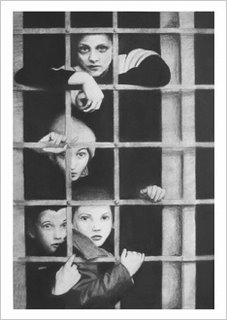
We know this for simple reasons: the brutality of Romanian dictator Nicolae Ceausescu’s brutal regime, which resulted in thousands of unwanted children being abandoned in orphanages across Romania. These forgotten children were kept in the filthiest of conditions, receiving on the barest essentials for survival. Those charged with their care were so overworked they did not have time (and perhaps the inclination) to go any further in the care of the children ... and if they did, it was too little, too late. These children spent countless hours in their cribs, lying in their filth and crying incessantly for hours without receiving the calming touch of another human at all.
When these children began being adopted by childless couples from North America in the 90's it was soon discovered that their was something very wrong; the fulfilled dreams of these couples came with an unexpected burden that all the love in the world couldn’t seem to repair. Their children were severely scarred by their early childhood experiences, scarred in a place that doesn't heal as easily as the body, scarred in their minds.

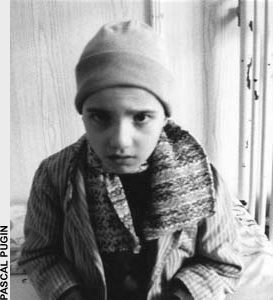
Many were so severely effected by their ordeals that their adoptions were reversed, the child proved to be too much for what the family had been prepared to provide.
If the parents of today who use their televisions, computers and other forms of electronica as babysitters continue on their course in child rearing their is the very real possibility that the only difference between our children and those brought here from Romania will be that the Canadians (and Americans) will, for the most part, have been better fed and educated, but their social skills will be barely above those of children who have had no socialization at all.
We have to start making the distinction between kids going out and being "social" with each other and actually being able to interact in a social situation without acting like savages amongst other humans. That is one of the most important skills for living, and it is one that will prepare them well for the struggles they will face in the real world once they discover that the artificial world of academia is far more sheltered than they could have imagined. I cannot count the times that I’ve been on the bus in the afternoon going home when there are several teens who get on, having just gotten out of school. Now I understand that everyone is excited about the end of the school day, I remember what that was like, but is it really necessary to scream, at the top of your lungs, while the person that you are talking to is sitting right next to you? Even when I put in earplugs that are very effective, it is still loud. This is not merely a sign of poor socialization; it is an indication that these kids have no idea that there is a proper way to act in public, especially when you are in an enclosed space like a bus (not even mentioning the fact that their actions could have distracted the driver, endangering the lives of everyone on board).
Even as I write this, I can't help but think of the young voters casting their votes in the United States today, and those who have the opportunity to vote in the municipal elections here in Ottawa next Monday. When I was young I looked forward to turning 18 the way some kids looked forward to turning 16. I had no interest in driving (I still don't have a license, and don't want one ... it doesn't do me any good since my Jag died ... right) ... no, I wanted to be able to vote!
It has always been the greatest pleasure to be able to participate in "the process", if only for the reason that I feel it gives me the right to voice my opinion about government without reservation – after all, I helped in the process. It has always amazed me how some people will go crazy talking about politics, but when you ask them if they vote, they quickly say, "I don't vote". Well, what kind of idiocy is that? How can you not vote, yet you want to spend so much energy complaining about things? Hubris, that is the word.
That is when I freak people out (a personal hobby ... and it costs nothing). "If you don't vote," I say, "you abdicate your right to complain about the system." That usually leaves people with their mouths hanging open (the word abdicate causes the hang-up, so I oblige them). "Voting is your duty as a citizen and gives you the right to complain about what YOUR government is doing. If you don't vote, they aren't your government."
That does it.
"But, I pay taxes," they sputter, indignant and embarrassed.
"Yes, but why don't you vote? Were you unable to get to the polling station, because if you were, you can call one of the candidates and they will eagerly arrange a ride for you on Election Day? If the day of the election was inconvenient there are several advance polling opportunities, and there is always the proxy vote as a last resort. Voting is what makes a democracy work. If the people can’t be bothered to care enough to get off of their complacency and help decide who their government is going to be, then a small, often narrow minded minority of those eligible to vote will make the decision. The smaller the sample that votes, the less representative it is of the actual views of the electorate. That is why it is so crucial to have as high a turnout at the polls as possible.
Besides, what message does it send to the youth of today when they see such voter apathy in the adults of today? When federal voter turnout skims 70%, what does that say? What would have happened if 100% of registered voters turned out to vote? What would happen if voting was a legal obligation, as it is in the Netherlands and New Zealand, where voter turnout is in the high nineties?
Only then will we see what the term "Democracy in action" truly means. Then, when the youth of North America sees that the adults are being responsible for what is going on around them, perhaps they will be a bit more receptive to what we have to say to them (either that or we have to start beating them ... that could always be a standby option).
Tags:
Adults, Canada, Ceausescu, Democrats, Orphans, Politics, Republicans, Romania, Teens, United States, Voting, Youth tears of sadness, and of joy
tears of sadness, and of joy



